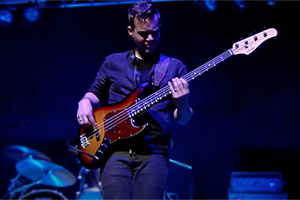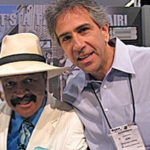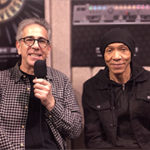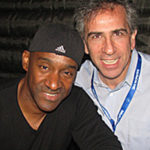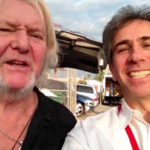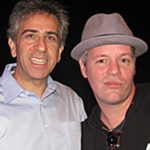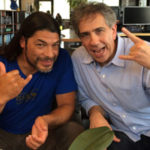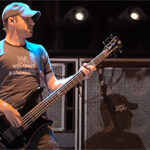Big Wreck bassist talks “bass nerdery” and the emotional impact of a song
Exclusive interview with FBPO’s Jon Liebman
September 13, 2021
Dave McMillan is the bass man for the Canadian/American rock band Big Wreck, whose single “Middle of Nowhere” (featuring Nickelback’s Chad Kroeger) hit #6 on Billboard’s Canada Rock chart earlier this month. The Ontario native is a graduate of Humber College in Toronto, where he focused on jazz studies. Since that time, the bassist has become known for his work with pop and rock acts like Justin Bieber, Carly Rae Jepsen, Nick Carter, The Philosopher Kings, Fefe Dobson, Ko, Crash Karma, Treble Charger and Shiloh.
FBPO: How did you become a bass player?
DM: I started up in high school. It was one of those situations where my friends wanted to start a band. By the time they got around to asking me, [it was an] “everything else was taken” kind of thing. So I ended up on the bass. I didn’t even know what it was at the time.
FBPO: Did you play an instrument before that?
DM: I did not, no. I had an acoustic guitar that just sat in the corner of my bedroom for a few years. I couldn’t wrap my head around it. Nobody else in my family really played any instruments either. It was just seemed like a fun thing to do in high school.
FBPO: Did you start listening to music differently after that? Picking out the bass on the radio.
DM: Oh, absolutely. I got into it because of bands like Nirvana and Pearl Jam and that whole Seattle scene. When that all became popular, that’s when I got into music in the first place. So even the bands I was playing in early on were from that kind of vein, I guess. And then from there on, I got into full nerdery bass listening.
FBPO: Full nerdery. I love that!
DM: Full nerdery! Somebody turned me on to Jaco and I got into that, and then I started discovering slapping, through Flea and Les Claypool and all that kind of stuff.
FBPO: In addition to rock, you seem to have an affinity for R&B bass playing. Would that be an accurate statement?
DM: Yeah, yeah. Pretty early on, while I was still in high school, I was playing a job in a band around the area that I grew up in. We had a lot of R&B in the set. I discovered James Jamerson and got into him pretty early. And then discovering Pino (Palladino), and then getting into guys like Larry Graham and Marcus Miller. I got pretty heavy into that stuff for quite a while, and I still am.
FBPO: You mentioned Nirvana. Were you into Krist Novoselic?
DM: Yeah! Like if I’m doing like a rock gig and it’s with a pick, his sound on the Nevermind record always is what I’m striving for. I love his playing on that, and his sound. I don’t think he gets quite the due he deserves. He’s such a fantastic [bassist]. He fit that band so well and the sound was so good. Him and Jeff Ament, early on for me, were such huge influences.
FBPO: I don’t see you playing too much with a pick. Is that something you do only when you have to?
DM: Oh, no. Whenever the song dictates for me. We have a pretty strong rule in the band: The biggest ego in the room is the song, so you go with what it tells you to do. We have quite a bit of stuff that I’m playing on it with a pick. For me, when I’m approaching the Big Wreck stuff, especially, there’s a couple of different approaches I’ll take. We’re all huge dUg Pinnick fans and King’s X, so I go for that kind of approach. Some of the songs we write are based around a really heavy riff. I’ll try them with fingers sometimes, but I generally gravitate to the pick, especially if I’m playing on the A string, for that kind of sound. I haven’t quite wrapped my head around playing A string with my fingers yet.
FBPO: How did your career get going, initially?
DM: I went to this college in Toronto called Humber College. I did the four-year jazz program there and coming out of that, I realized I wasn’t really going to be a jazz musician while I was there. Just wasn’t. I mean, I love it. There’s a lot of jazz I love, but it just wasn’t where my heart was. Coming out of college, I ended up getting, through some guys I had met there, like a pop/rock gig that was doing pretty good, and toured a bunch with that. I started in the Ontario scene and then started to stretch out from that. I was with a singer named Angela Lee and through that, I met some other people, and it all became kind of networking through the Toronto area. Then I did a bunch of tours with different artists, a lot of pop stuff early on, backing up different singers. That’s how I built it up. It was all pretty much through word of mouth.
FBPO: What’s keeping you busy these days? “Middle of Nowhere” seems to be getting a lot of attention.
DM: Yeah, yeah, it’s doing good. Ian (Thornley), our singer/guitarist and head writer for the band, he and I flew out to Vancouver to Chad Kroeger’s place back in the fall. We spent a week kind of isolating out there and just writing, and that was one of the ones that came out of it. Pretty excited about it. It was a fun song. It’s a little different for us, just in the style and the approach, having a second singer on a song, and having a guest vocal. That was the new thing at the time for us. It’s doing well here in Canada. I’m not sure how it’s doing down south, but I know in Canada we’re getting quite a bit of spin off of it. We’ve done a few shows recently where we’ve played it and it’s gotten a great response, so it’s a fun one. It’s a fun summer rocker kind of tune.
FBPO: How did the collaboration with Chad come about?
DM: He and Ian go way back. I might be wrong about this, but I’m pretty sure Nickelback’s first tour was opening for Big Wreck with the original lineup, back in the day. I think that’s how they met and they’ve remained friends ever since. He’ll come out to some shows. We played in Vancouver a few years back and he showed up and got up on stage and we did an AC/DC cover.
FBPO: Is “Middle of Nowhere” the start of what’s going to be a new album, or is that just a one-off single?
DM: There’s two songs that we did with Chad, but I think that might be the only one that’s actually going to be released for now. We did just finish recording 15 songs, separate from those, that were like a new album. The plan as of right now is to release it as three separate five-song EPs, and those will start dropping in fall, as far as I know. I don’t have an exact date on that.
FBPO: You must be happy about hitting the road again with the band again this fall.
DM: Oh, I can’t wait! It’s been a while. We just finally did a show in front of an actual audience of people recently. We’ve been doing the drive-in shows throughout this whole thing when we could. In Canada you can’t really do those in the winter, so it was a long winter of no shows. We did a couple of the drive-in shows and a livestream. And then we actually went out to Calgary to play at the stampede. It was an actual audience of people in front of us, which was pretty exciting. Got a little emotional on stage there for a second. It was amazing getting back to a real audience. We cannot wait to get out with our buddies in Monster Truck. That’s another amazing Canadian rock band with us. It’s going to be a lot of fun.
FBPO: You seem to enjoy playing “Ghosts.” Not only have you done some great bass lines on that song, but some great bass solos too.
DM: Well, thank you very much. That’s a fun one. When we did that in the studio, my original bass line of that was quite a bit simpler. And I remember being in the studio. It was the only time I’ve ever had my career when I had a producer constantly being like, “No, play more. We need more, more!” And it was just constant. I’m like, “Okay, okay. Stop yelling at me. I’ll solo!” I remember the first time I heard it, I was like, “Oh my God, this is so much bass on the song. I’m so loud.” It was one of those like, “No one’s ever going to hire me ever again after they hear this.” As a bass player, you always get a little nervous about overplaying on a song, but everybody loves it. It’s done well, and it’s so much fun to play live. We’ve kind of been stretching that one out over the past few shows. We’ve recently got a new drummer in the band, Sekou Lumumba, and the ending jams we’ve been doing with him are just incredible. It’s been a lot of fun!
FBPO: Tell me about your gear.
DM: Well, my main basses, I guess, would be my Suhrs, made by John Suhr in California. I use the classic Js. Those are kind of the main guys. I’m not sure if [you’re] familiar with Meridian guitars out of Boston, Jim Meridian, who passed away now a couple of years ago. I think he was the tech for Chris Squire at one point. And his son, John, was Ian’s guitar tech back in the day, and they’ve remained friends. Just a little while after Jim passed away, we were playing in Boston and John showed up with an eight-string bass that his dad had made as a gift for Ian. And so that immediately was like, “Okay, we’re using this.” And because in the original Big Wreck, with Dave Henning, most of that stuff was done on eight strings, and we had a 12-string Hamer that was strung as an eight-string, if what I’ve been told is correct.
FBPO: How is it strung? Is it a four-string doubled?
DM: Yeah, like a 12-string guitar concept. So that one gets quite a bit of use in the set too. Other than those, I still have my F Bass made here in Hamilton (Ontario, Canada). I use those and I use the Suhrs.
FBPO: What kind of strings do you use?
DM: D’Addario. I’ve tried pretty much everything and I always end up coming back to the D’Addario. I think everybody in the band uses D’Addarios now. I’m pretty basic. I’ve tried other versions, but I always just go back to their standard nickel-wound rounds. I have an old ‘78 Fender Jazz bass, ash maple, that I use the stainlesses on. Other than that, everything was just the nickel 45 to 105. And even for my eight-string too. It’s their eight-string set.
FBPO: What about amps?
DM: My cabinets are all Ashdown. I’ve been using them forever. I bought my first Ashdown probably close to 20 years ago. I’m kind of a creature of habit. Once I find something I like, I tend to stick to it. I find new gear all the time. I’m always finding new pedals or stuff, but I always end up going back to the ones that I’m used to. When I’m around for my local work and at home, I use a Bergantino setup, which is amazing. Those things are incredible. And my main head on the road is a Fender Super Bassman, the 300 tube head, which is fantastic. That thing’s been on every record I’ve done with Big Wreck. I think I got it right before the first album I did with them.
FBPO: How about effects and pedals?
DM: Mainly it’s Tech 21 stuff. My main tone center is the DI 2112, the Geddy Lee pedal, which I just got before we started doing this last round of shows. Up until then it has been the VT DI, which is kind of their SVT simulator. We use in-ears in our band, so I’m mainly using that DI 2112. That and the dUg (Pinnick) pedal that they make. Those are my two core sounds. Everything is built around that.
FBPO: What advice do you have for someone who wants to learn bass?
DM: I get asked that all the time. I always struggle with a good answer for that, but I really think that if you’re going to start to learn bass, a really important thing is to be able to listen not just to yourself, but hearing the band as a whole and fitting into that, being able to play a bass line yet have your main focus actually be elsewhere. Like for me, I’m not just focused on myself. You can hear sometimes, when a bass player… and we’re all guilty of this. I’ve been very guilty of this in the past where you’re so loud, because you’re just trying to hear your tone. You spent all this time getting this sound and your focus is there and you can tell when you hear it, things aren’t locking. I think it’s very important for people to be able to listen to a song from the outside, to see it from a bird’s eye view with your ears, if that makes sense. That’s a big one for me as a bass player, once I realized that, I started to progress quite a bit because it wasn’t just about me anymore. It was about making the song as good as it can be.
FBPO: I love what you said before about how the biggest ego in the room is the song.
DM: Yes. That’s an Ian Thornley line. I don’t know if he got it somewhere else, but the first time I heard that from him, I was like, “That’s brilliant.” You always want to show off what you can do, but sometimes that gets in the way of the song. Like, what is it that you’re trying to actually get across to people? Everything’s got its place, but you know, just because I learned how to play some crazy diminished line, where I can do this cool phrase, and all this kind of cool stuff… but if you throw that in the wrong context, it’s not going to sound good and it’s going to take away from the song. You’ve got to play for what the song is about. I think it’s understanding what the song is about, understanding what the emotional impact of that song is supposed to be, and all those things come into play when it’s time to actually play the song. So yeah, I think you’ve just got to serve the song and let it do its thing.
FBPO: Beautifully stated.
DM: Also, I just wanted to mention this to you. Recently we were moving some stuff around in my house and I found a bunch of old books and I had, and I didn’t know this, but it occurred to me as I was going through them, the Funk Bass book that you wrote, the slap bass book. That was you. Right?
FBPO: Yes.
DM: And that was like the main book, all through high school. And I remember in high school and for college, that book was how I learned how to slap. It was that book. So thank you for that.
FBPO: Well, thank you. That’s my first book.
DM: It was like a bible to me.
What would you be if you weren’t a bass player?
DM: Unemployed. [Laughs] Ooh, that’s a tough one. I’ve been a bass player since I was 16. I’d like to think it still has something to do with the arts in some aspect, maybe something in graphic design or something like that. But I really don’t know. It’s never been an option. I’ve focused my whole life on trying to make a career out of this. I never had a plan B.
See Jon’s blog, with key takeaways from this interview here.
